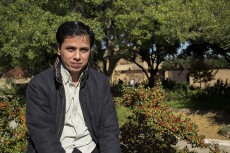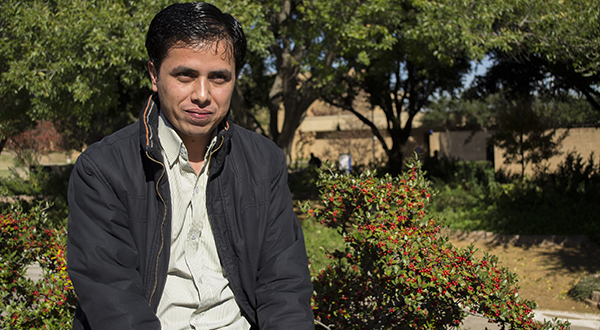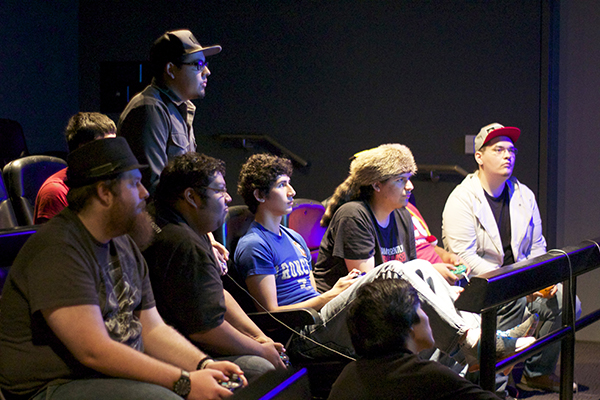By Jamil Oakford/ managing editor
In a sterile, run-of-the-mill classroom, NW student Som Bhandari paints a vivid picture that mentally transports him to lush mountainsides and a rural area.
He describes warm summers, days spent outside in the sun, learning how to work the land.

Katelyn Townsend/The Collegian
He’s describing home, his life in Bhutan, a land that he fled because of what he described was discrimination and intolerance from the government.
The NW student has had a journey to TCC rife with obstacles that he’s successfully overcome: gradual hearing loss, religious and cultural suppression, a refugee camp and a second chance to retain a normal life.
But through all the changing and challenging scenery, education is a thread that’s connected and motivated Bhandari throughout his life starting in his homeland of Bhutan.
Bhandari grew up in a farming community with his family in a country he still remembers fondly.
“I remember going to school, going to picnics,” he said. “I recall our parents harvesting crops during bright and warm winters. I miss Bhutan.”
While their religious festivals and fond memories of friends and a simple farming life make up a life he misses, Bhandari and people of Nepali ethnicity were quickly reminded how unwelcome they were in Bhutan.
Bhandari and his family fled his home country because of what he said were the Bhutanese government’s efforts to force the population of citizens from Nepal to conform to the Bhutanese way of life.
“There was an implementation of Bhutanization policy, demanding that all Bhutanese follow the Buddhist culture,” Bhandari said.
This policy required the country’s citizens to speak the national language, wear its national dress at all places of business or government and to follow the Buddhist religion. While it was not stated explicitly through the policy, the Nepali ethnic group in Bhutan understood that this was aimed at them, Bhandari said.
“The policy targeted Nepali ethnics living in Bhutan because the government was growing suspicious of their progress in the field of education and job prospects,” he said.
As protests sparked and people questioned the policy, the government began to label acts of protests as treason.
“I became a refugee at 7 or 8,” he said.
Bhandari and his family moved to Nepal, where they lived in a refugee camp for a few weeks. At the time, Nepal was dealing with a war, and his family soon realized that they couldn’t return to Bhutan.
“We had India blocking our way — we didn’t have any option,” he said.
While his family was trying to find a life that would allow them the religious and cultural freedom to be themselves, Bhandari was suffering from progressive hearing loss.
“I suffered gradual loss of hearing, and I became worried,” he said. “If you don’t hear, you don’t understand and you’re left behind.”
In his culture, disabilities were not blamed on genes, luck of the draw or environmental circumstances. They were blamed on deeds, Bhandari said.
“The mentality was if you have a disability, you’ve done something in a past life,” he said. “You can be seen as a burden to your family. You couldn’t become an important person.”
These factors added to Bhandari’s apprehension about his disability. However, he continued to read and learn as much as he could.
In 2007, his family, along with thousands of other families, was offered an option to relocate as refugees. Canada, Australia, the Netherlands and the United States were among the countries offering relief for those living in Nepali refugee camps, fleeing the persecution of Bhutan.
India still refused to take in refugees, Bhutan still held to its discriminatory policies and Nepal dealt with its own issues. Bhandari’s family felt boxed in one place. The option to relocate was desperately needed.
“We had to accept the option,” he said. “We felt excited.”
Bhandari remembered when he learned in school about how America was founded.
“The American idea of freedom and opportunity, all of that,” he said. “So for me, yes, it was exciting. Coming to America was a dream fulfilled.”
He arrived in Texas on a plane seven years ago. And while college was a dream for Bhandari, he immediately put his efforts into finding work.
“I was working at a cellphone company,” he said. “I had a basic entry-level position.”
As he continued to work hard, he felt the distance between his dream to attend college grow.
“I thought about college, and I felt frustration,” he said.
Instead of wallowing in his frustration, Bhandari began taking ESL classes so he could begin taking college courses at the University of Texas at Dallas.
“I didn’t want to stay in ESL classes. I wanted to challenge myself,” he said. “I wanted to put a lot of effort into learning English, but in my ESL classes, I felt dejected.”
Bhandari already knew a great deal of English because of school back in Bhutan and felt like his time spent in the ESL classes was holding him back.
“Som is highly creative,” fellow UTD graduate and friend Nir Adhikari said. “He’s dedicated and hard-working.”
Another friend, Shashi Kattel, explained that he bonded with Bhandari through their shared goals and similar hardships.
“Som had never let his struggle to define him and never allowed his obstacles to interfere in becoming the person he is today,” he said. “So I would describe him as a very determined person.”
Dedication and hard work pushed Bhandari through the ESL classes and straight into bachelor’s-level classes.
As he took classes, he noticed differences in American culture that he found empowering. The treatment of those with disabilities wasn’t as harsh as it was back home.
“People here were more open-minded,” Bhandari said. “The society was more inclusive. The idea of equality and freedom were incredible, and that made me feel more included.”
But he still struggled at times to find his place.
“It was still hard for me to maintain contact with classmates,” he said. “Everyone seemed to be in their own world.”
A few years later, Bhandari was in a car accident while he was attending UTD.
“After my car accident, my life changed forever,” he said. “I found my world a lot different than before.”
But after suffering a head injury in that car accident, Bhandari’s drive was more present than diminished.
“My friend was telling me, ‘You’ve already faced the worst. It can only get better,’” he said.
He completed his bachelor’s degree in accounting and two years ago became a naturalized citizen. He now attends school at TCC to take more technology and math classes as learning was always a major emphasis for him.
“My parents always said that with more education the better the job you could do,” Bhandari said. “You can make a wise decision.”





























